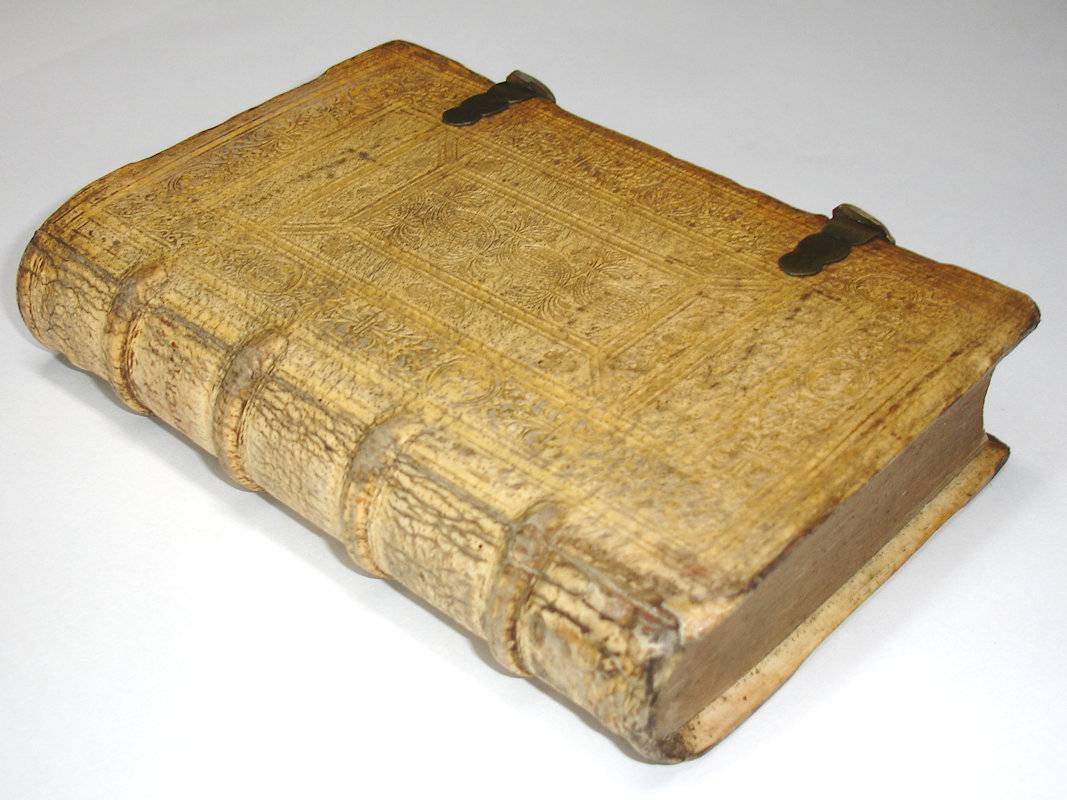HIPPOCRATES.
Hippocratis Coi, Medicorum omnium facile principis, Liber secundus de morbis vulgaribus, difficilimus & pulcherrimus; olim a Galeno commentariis illustratus, qui temporis iniuria interciderunt, nunc vero pene in integrum restitutus, commentariis sex & latinitate donatus, Anutio Foësio Mediomatrico Medico authore. Ad Carolum Lotharingium, Lotharingiae Ducem illustrissimum.
Basel (Basileae), 1560. (Colophon at the end: 'Excudebat Iacobus Parcus, expensis viduae M. Isingrinei, anno 1560, mense martio)
8vo. (LVI),501,(1 blank),(16) p. Pigskin over wooded boards. 17.5 cm 'Interesting text with an interesting provenance' (
Ref: VD16 H 3797; Maloney & Savoie no. 369; not in Ebert, Graesse or Brunet) (
Details: Back with 4 raised bands. The boards are decorated with blind stamped triple fillet borders and a row consisting of floral motives and some tiny portraits; the central panel of the boards shows palmet motives. 4 contemporary brass clasps on the outer edge of the covers. Woodcut initials. Each chapter contains the Greek text, followed by a Latin translation, and a extensive commentary. Good quality paper) (
Condition: Pigskin soiled and slightly stained. The back shows craquelure. The lower corners are somewhat abraded. Front joint starting to split at the foot of spine. The clasps of the catches are gone, and have been replaced by two strips of leather. Flyleaf at the end gone. Bookplate pasted on the inside of the upper board) (
Note: The Greek physician Hippocrates, 460-370 B.C., is known as the father of medicine, and was the first epidemiologist. He sought a logic to sickness, and attempted to explain disease occurrence from a rational perspective rather than a supernatural basis. In his day people generally thought that one was sick because of the gods. Hippocrates was the first to examine the relationships between the occurrence of disease and environmental influences and human behaviour. The distinction between 'epidemic' and 'endemic' was drawn by Hippocrates to distinguish between diseases that are 'visited upon' a population (epidemic, i.e diseases that seem to appear and disappear over time) from those that 'reside within' a population (endemic, a disease specific to one location)
The treatise 'Epidemics' consists of seven books. Each book contains, in addition to the case histories, two other types of material: constitutions and generalizations (aphorisms, prognostic indications, lists of things to consider, various notes)
§ This is the fist work of Anuce Foës (Anutius Foesius), 1528-1595, an edition of the second book of the 'Epidemics' (de morbis vulgaribus), it includes a Latin translation and an extensive commentary. Foës studied medicine at Paris and returned to his native city Metz to become city physician. He worked 8 years on this book, he tells in the 'praefatio'. This was the beginning of a lifelong dedication to Hippocrates and scholarship. After more than 30 years of hard work Foës produced in 1595 the Hippocrates edition which was to remain the best edition of the Greek text, and Latin translation for 250 years. It was only surpassed by the edition of Littré of 1839/61. The edition of Foës shows profound criticism and has learned commentaries; his variant readings are numerous and well chosen) (
Provenance: The engraved bookplate belongs to the German author and philosopher Ernst Jünger, 1895 - 1998. The manuscript text on the bookplate reads: 'Für Gerhard Nebel, zum Geburtstage. Ernst Jünger, 26-9-1948'. Ernst Jünger was a highly decorated German soldier and author who became famous for his World War I memoir 'In Stahlgewittern' (Storm of Steel). Jünger rebelled against an affluent upbringing and sought adventure in the Wandervogel movement, before running away to briefly serve in the French Foreign Legion, an illegal act. Because he escaped prosecution in Germany due to his father's efforts, Jünger was able to enlist on the outbreak of war in 1914. In the aftermath of World War II Jünger was treated with some suspicion as a possible fellow traveler of the Nazis. By the latter stages of the Cold War his unorthodox writings about the impact of materialism in modern society were widely seen as conservative rather than radical nationalist, and his philosophical works came to be highly regarded in mainstream German circles. Jünger ended his long life as a honoured establishment figure, although critics continued to charge him with the glorification of war as a transcending experience.
§ Gerhard Nebel, 1903-1974, was a German author and conservative cultural critic. He studied philosophy and classical philology in Freiburg, Marburg and Heidelberg from 1923 to 1927. He took his doctor's degree in Heidelberg in 1927 with a dissertation 'Plotins Kategorien der intelligibelen Welt'. Nebel was drafted into the Luftwaffe and worked as a translator in Paris in 1941, where he met Ernst Jünger. After the war, he worked again as a teacher. He published his diaries, and the essay collections 'Von den Elementen' and 'Tyrannis und Freiheit'. Nebel was highly influenced by Jünger, to whom he dedicated his first books. In 1948 appeared his 'Ernst Jünger und das Schicksal des Menschen', followed by 'Ernst Jünger, Abenteuer des Geistes' (1949), in which he offered an interpretation of Jünger's work. The correspondence between the two men was published in 2003) (Source for Jünger and Nebel Wikipedia)) (
Collation: alpha8, beta8, gamma8, delta4; a-z8, A-I8, K4 (minus blank leaf K4)) (Photographs on request)
Book number: 130092 Euro 1900.00
Keywords: (Oude Druk), (Rare Books), Binding, Greek text, Hippocrates, Hippokrates, Latin translation, Medizin, Swiss imprints, antike altertum antiquity, medicine
 HIPPOCRATES.
HIPPOCRATES.